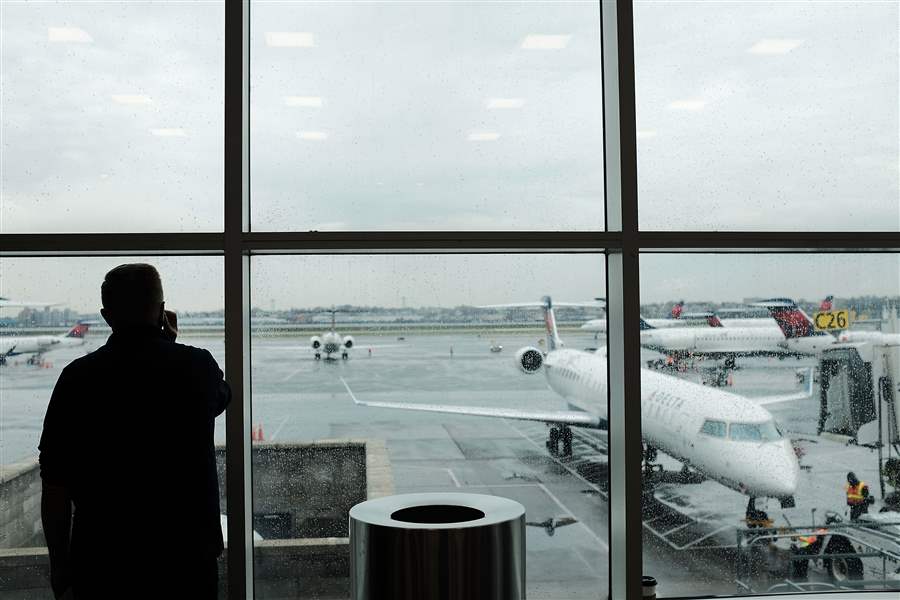
‘Quiet Skies’ and the risk of losing liberty for good
8/3/2018
A secret domestic surveillance program called Quiet Skies subjects ordinary U.S. citizens to “targeted airport and in-flight surveillance."
Getty Images/Spencer Platt

Will Tomer
The Boston Globe’s recent report on a secret domestic surveillance program under which federal air marshals follow U.S. citizens highlights the continuing transformation of the United States into a surveillance state.
The air marshal program, known as Quiet Skies, subjects U.S. citizens to “targeted airport and in-flight surveillance, carried out by small teams of armed, undercover air marshals.”
According to internal documents from the Transportation Security Administration, Quiet Skies specifically targets individuals who “are not under investigation by any agency and are not in the Terrorist Screening Data Base.”
The stated mission of Quiet Skies is to stop threats to commercial flights “posed by unknown or partially known terrorists.” The internal documents show that TSA is given a great deal of freedom in identifying targets for surveillance and how closely targets are monitored.
According to the Globe, when a traveler is selected for surveillance, a team of air marshals is placed on their flight and given a dossier of information about the traveler, including a photo, age, and place of birth.
The marshals then follow the traveler and take note of his or her behavior. This includes “whether travelers use a phone, go to the bathroom, chat with others, or change clothes,” as well as more subjective observations about passengers’ demeanor or facial expressions.
Interviews with air marshals, as well as internal communications examined by the Globe, reveal that there are concerns about the costs of the program and the fact that ordinary travelers are frequently the target of this surveillance.
The Globe’s reporting has already sparked concern from some lawmakers.
Senator Ed Markey (D., Mass.) sent a letter to the head of TSA last Monday, requesting more information about Quiet Skies and answers to questions about the program’s workings.
“The Quiet Skies program is the very definition of ‘Big Brother,’ and innocent Americans should not be subject to this kind of violation of their rights,” Mr. Markey said in a statement.
However, according to TSA spokesperson James Gregory, the TSA detailed Quiet Skies to multiple congressional committees in May. A report by the Epoch Times states that TSA has regularly briefed multiple congressional committees about Quiet Skies since it started in 2010.
Quiet Skies has its defenders, too.
A Washington Post editorial acknowledged that Quiet Skies might seem “creepy,” and argued that the program could benefit from adjustments. But the Post asserted that the program is ultimately a reasonable use of TSA’s time and resources.
Important questions have emerged about Quiet Skies, adding to the larger conversation about government surveillance. How much did Congress know about Quiet Skies? Did the program stop any genuine threats? How many people and how much money were allocated to Quiet Skies?
Given the nature and significance of those and other relevant questions, it seems reasonable to urge that the Quiet Skies program should be subject to public review, and that TSA’s explanations and evidence should scrutinized carefully by Congress and the general public.
But, thus far, Quiet Skies has been scarcely analyzed beyond the pieces published by the Globe and one Washington Post editorial. About half of the country still gets its news from television, and little-to-no coverage time has been allotted on any major news channel — CNN, Fox, MSNBC — to discussion of Quiet Skies.
There are two reasons for this. The first is that the main television news networks have seen that news about President Donald Trump attracts more viewership than anything else.
The second, and, in my opinion, more troubling, explanation is that state surveillance is being normalized within the U.S.
To put it plainly, Quiet Skies is a federal surveillance program that targets average citizens as they travel through the nation’s airports. This program is merely the latest brick in the wall in the construction of the U.S. as a surveillance state.
After the Sept. 11 attacks, the American people were persuaded that an expansive surveillance apparatus was needed to keep the country safe. Legislation such as the PATRIOT Act was rushed through Congress and the nation’s intelligence agencies quickly found themselves with the power to conduct nearly limitless surveillance. The initial mandate to target enemies of the U.S. quickly expanded to include just about everyone.
We know that a substantial number of federal intelligence-gathering programs have been put in place. There is, moreover, ample reason to believe that other programs, including programs that engage in forms of domestic surveillance once considered unacceptable, have been authorized and are in operation.
Revelations about initiatives like the National Security Agency’s PRISM and Stellar Wind programs once stirred controversy and engendered meaningful discussions about state surveillance and its legality.
RELATED: Homeland Security’s Orwellian new biometric database
More recently, however, apathy has taken hold.
People have been told there is nothing they can do about the government spying on them, and they believe it. As a result, programs like Quiet Skies or Homeland Security’s biometric HART database have been allowed to move ahead without much debate or opposition.
This is not an acceptable state of affairs. It is, in fact, a highly dangerous one. Programs that spy on Americans, whatever the rationale for them, should be opposed, because such programs threaten the liberties on which this country is based.
The issue isn’t the content of your email messages or your phone calls or how often you use the restroom at the airport. The issue is that our freedoms are threatened when the government collects information on you and me and other American citizens because it can, when our lawmakers rationalize such activities in the name of national security, and when the government builds databases and dossiers on citizens without the legal justification and processes traditionally mandated by our laws.
Citizens must be willing to stand up for their civil liberties and demand that the government stop spying on us.
There can be no doubt that balancing the requirements of national security against the rights afforded to U.S. citizens by the Constitution is complex business. But allowing our civil liberties to be eroded through the expansion of the surveillance state is a terrible bargain, and one for which we will pay an awful price should we fail to stop it.
As John Adams once wrote: “Liberty, once lost, is lost forever.”
Contact Will Tomer at wtomer@theblade.com, 419-724-6404, or on Twitter @WillTomer.